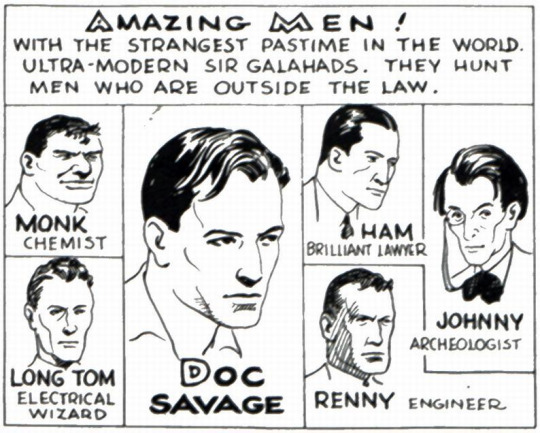#Lester Dent
Note
Could I hear more of your thoughts on Doc Savage and the archetype he created? How does it relate to modern superheroes more specifically Reed Richards? (I know that you dislike Doc Savage, so sorry if this bothers you.)
Sorta like this, if we take a look at how Doc's archetype was formed and consolidated, and how that affected the Superheroes and Reed Richards specifically. (also please don't apologize, you all can ask me questions about whatever, seriously)
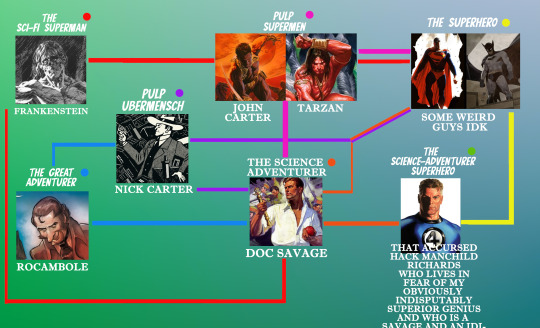
"Doc Savage" is recognizable in lots of other characters but there is a difference between specific pastiches or tributes or parodies of Doc (Doc Samson, Edison Rex, Jonas Venture), and characters who are evoking Doc Savage as his own archetype to draw initial inspiration from (Tom Strong, Bane, Clark Kent), and if we pull at Doc's roots we're gonna get to prior characters like Tarzan and Sherlock who were the ones to introduce or codify much of what are now commonplace superhero traits or the ones to introduce much of what Doc was originally pulling from.
I wanna draw some lines in the sand separating what is it that these characters brought to the table, in the road to get to Reed Richards and what exactly is it that Reed and Doc have in common vs things they have that are mainly taken from characters before them/grandfathered in their respective mediums. So let's go over the Archetypes here:
The Sci-Fi Superman: Coined by Peter Coogan. Through some strange birth or scientific intervention, these characters have superhuman powers and abilities that set them irrevocably apart from humanity, nearly forcing them to usually fall into the roles of saviors, rulers, destroyers, or ostracized/self-imposed hermits. Unless they find a purpose requiring said abilites, they cannot be permitted to exist and usually meet a tragic demise or is stripped of said power. Formative example is The Creature from Frankenstein (Mary Shelley), and others include Hugo Danner from Gladiator (Phillip Wylie) and Bill Dunn from The Reign of The Superman (Jerry Siegel). Coogan considers John Carter the first wholly positive and heroic SF superman, which is disputable, but more on Carter later.
Pulp Ubermensch: The Great Man turned do-gooding adventurer with a prosocial agenda. A human who is physically, mentally, and/or morally superior to those around him as a result of training/upbringing, skilled at everything the story requires him to, who applies his talents and abilities near-exclusively to fight evil. Formative example is Nick Carter (created by John R. Coryell and penned by Frederick Van Rensselaer Dey), who established much of what would eventually become pulp hero and superhero convention consequently.
The Great Adventurer: I'm naming these as a counterpoint to The Great Detective, the fantastical globetrotting adventurer/explorer hero who can go anywhere and do anything, who takes to the world as the detective takes to the city. The idea of a wealthy, offbeat, yet good-natured pulp hero who goes around righting wrongs with like-minded assistants. Formative example here is Rocambole (Ponson du Terrail), in most ways a definitive early Pulp Ubermensch, and arguably the first proto-superhero to assemble a gang of odd companions with a variety of talents and backgrounds to aid him, which is what both the Fabulous Five and the Fantastic Four can trace roots back to.
Pulp Supermen: Offshoots of the Sci-Fi Superman as adventure protagonists in serialized stories, where their superhuman natures and status are alleviated and redirected by the need of their capabilities somewhere or in service of something, and thus they get around the ruler/savior/destroyer fate by being heroes with a social calling akin to the Pulp Ubermensch, dedicated to use their powers near-exclusively to fight injustice without rocking the boat of society by their presence (or if necessary, assert dominion ONLY in a setting outside of human society, such as the jungle or Martian civilization). Distinguished from the Pulp Ubermensch by their greater larger-than-life explicitly superhuman abilities, that they don't need to be morally/mentally superior to the extent of a Pulp Ubermensch, and by the fantastical settings and tone of their adventures. Formative examples are John Carter of Mars and Tarzan of the Apes (both created by Edgar Rice Burroughs), with Tarzan quoted by Lester Dent as a specific influence on Doc (there are others but we're skipping most of those not relevant here)
The Science Adventurer: A frequently-used name to describe Doc Savage and Doc Savage-alikes. Doc Savage can be described, in archetype word salad terms, as a Pulp Superman who calls upon the Pulp Ubermensch's great man-ness and urban social calling, and who combines a Sci-Fi Superman origin and physical traits with The Great Adventurer's explorer disposition, righteousness and band of companions. The main thing that sets him apart from the characters listed prior is his focus on scientific prowess, technology, reasoning and polymathic skills, the importance of the "Doc" part of his name as it where.
The Superhero: you already know what these are and how they relate to the above. I've written a couple of things about the differences between pulp heroes and superheroes and it's a subject I'm of constantly mixed opinions on even regarding stuff I wrote, so I'm linking these two written a year apart if you want an idea of where those differences are.
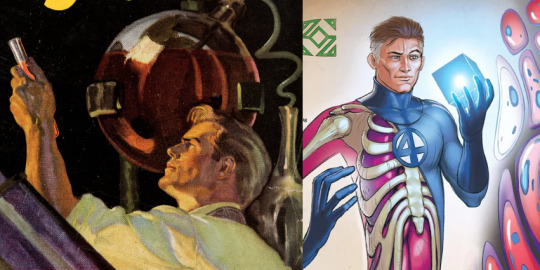
And so we get to Reed, who I'm naming a Science-Adventurer Superhero as a merger of the last two. Both Stan Lee and Jack Kirby mentioned several times that they read Doc Savage aplenty during the Depression and it shows in elements such as the Baxter Building (an expansion of Doc's headquarters in the Empire State Building - instead of just the 86th floor, The Four get the entire skyscraper), the specialized aircraft and vehicles, the fights and antagonism between the cantankerous and anti-social Ben Grimm and the smart-mouthed Johnny Storm mirroring the bickering spats between the bestial Monk and the silver-tongued Ham, and of course Beast from X-Men being more closeled modeled on Monk's ape-ish traits and scientific expertise (there's a fairly large argument to be made, that I think accounts for some of why Beast is, like that, in recent comics, that Ben Grimm and Hank McCoy both divided Monk Mayfair's every trait between themselves and ultimately flipped the script in the long run before taking it to the farthest extremes possible as polarized opposites of each other, with Ben initially getting most of the bad parts and making them the best ones, and Hank initially getting all the good ones and making them into the worst ones)
As far as I know, Reed Richards was not consciously modeled after Doc Savage (although Jack Kirby and Joe Simon's Private Strong used the origin story of a professor raising his son in a lab to be perfect in total isolation of other humans, which Lester likely may have pulled from Phillip Wylie's The Savage Gentleman to begin with), although it's commonly said that the direct precursors of the Four, the Challengers of the Unknown, were modeled after Doc Savage and the Fabulous Five's make-up. The members of the Fantastic Four are all based on 50s sci-fi archetypes, with Reed as the quintessential scientist, the grey-templed pipe-smoking patriarch frontman of the expeditions, and some creators over the years seem to have drawn upon Doc Savage as a model Reed. I'm thinking specifically of Mark Waid here, who openly named Doc Savage in his pitch bible:
The eternal problem with Scientifically Inclined Genius Adventures, the reason they don't ring true, is because in real life scientists spend all their damn time in the lab. Not Reed.
F'r pete's sake, we know he undertook all sorts of Indiana Jones missions as a younger man, we've seen that he actively enlisted in a war, and oh yeah, he stole a rocketship and tried to take it to the moon."
Tommy B put his finger on it when he suggested I stop thinking of Reed as the Professor from Gilligan's Island and instead think of him more like Doc Savage. When Reed encounters mental or logistic obstacles in his quest for knowledge, he thinks through them.
Doc Savage, of course, isn't the perfect model - he's a little more blood-and-gristle than Reed, more invested in the search for justice than for knowledge, and a little more "in the moment" as a general rule. Reed's more like Peter Weller as Buckaroo Banzai, they have the same aloof, detached nature. Unless active danger is staring him right in the face, Reed often seems a bit distant and not completely here because his mind is ten minutes in the future.
That addresses the Science-Adventurer aspect, which leaves us with the Superhero side of the equation.
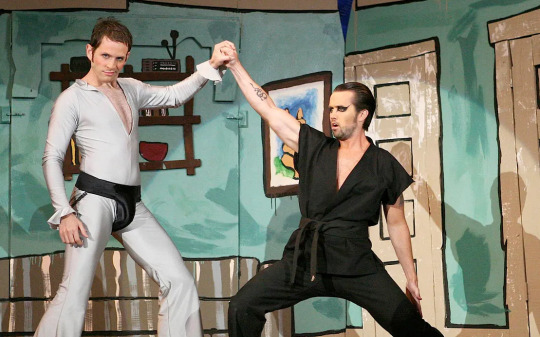
With Doc Savage you of course have one of the, if not the, main archetypal pulp heroes, a character that both Superman and Batman would take a great deal from, and "pulp hero" in itself is a term that exists to define these characters more so in relation to superheroes than what they were actually like in their own stories, time periods and mediums. The superhero as a concept is founded on Superman and Batman and their dychotomy. Costumed Avenger vs Ubermensch, mortal and immortal, light and dark, Dayman and Nightman (AHH-ahhh-AAHHHHH!), and that dynamic is specifically a result of Superman and Batman being direct descendants from Doc Savage and The Shadow respectively, who were Street & Smith's (and by extension the American pulps) Big Two, the top dogs of 1930s hero pulps, and direct opposites to each other.
Doc Savage was created in response to The Phantom Detective (who was the first successful Shadow imitator and thus defined it as the thing everyone was gonna have to do or respond to) and was in many ways a modernized revamp-almost-copy of Street & Smith's Nick Carter during his heyday, in origin and first case and super strength and omnicapable skills and general Great Man-ness and gadgetry and mission statement and so on. Doc was co-created by the editor of Nick Carter Magazine, John Nanovic, and the first response to the Phantom Detective that S&S planned was a reboot of Nick Carter as a generic hardboiled detective, published on March 1933, the same month as Doc's debut, and obviously Doc would go on to achieve much greater success and thus would popularize those traits again with himself as the figurehead archetype of them (not unlike what Superman and Batman would later do).
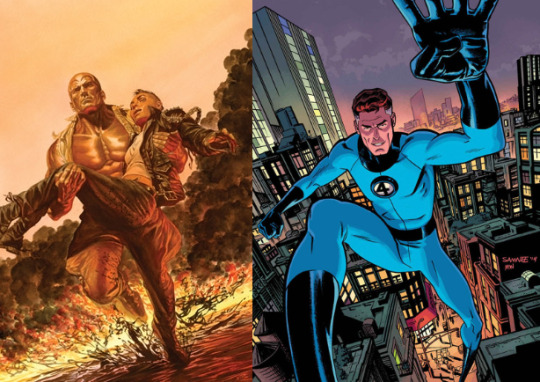
Unlike The Shadow, Doc Savage does not operate under a secret identity or mask. He is not the hidden master of the city and has no division between his alter egos, and because he performs in broad daylight as a celebrity, is theorically held to social scrutiny, and is fully sanctioned and approved by law enforcement and works with the authorities with public transparency (minus the crime college but let's just, not, for now), it greatly upends and affects the approach he takes to fighting crime. He only has one identity, the greatest man of all time as the stories will remind you at every turn, by his author's own words he "manifests Christliness", and while not much separates Doc Savage's skills from Nick Carter's, he is explicitly and textually framed as superhuman (even a "superman", that term was deployed a few times), and he operates in a contemporary, urban setting that most Pulp Supermen cannot touch without veering into Sci-Fi Superman territory.
Within the hero pulp format that S&S started with Nick Carter and renewed with The Shadow, with the scientific explorer angle, you could argue Doc Savage, in almost exactly the same way as he does in his stories, worked out the solution to an unfixable problem: Turns out you can be as over-the-top super as you want, so long as you have a procession of equivalent super menaces to fight, don't upset society (and if you do it, not where the public where can see, keep it a secret that you can be blackmailed over by crooks you will inevitably silence okay look I'll stop now), have whatever incredible miracle cures and achievements and charity you do work on take place off screen where you never have to deal with them too seriously, and know how to pick your fights.
His service to others resolves the ruler/savior/destroyer conundrum. Savage aids individuals who face problems beyond their control, does great work in advancing medicine and science, and alleviates suffering through charity work, but he leaves the institutions of society in place.
He faces a never-ending succession of villains threatening society, an eternal frontier of gangsters and super-scientific menaces who play the role that Indians take in frontier narratives. The unresolvable nature of crime makes this frontier eternal, so Savage can place his superiority in service to the community and never risk turning into a ruler, savior, or destroyer because he can find challenges sufficient to absorb his energies.
The Savage solution—the hero position would be adopted by the creators of other prosocial supermen to come, including Superman, although only the adventures of Superman would be set in contemporary America.
Thus instead of marking an end to the bourgeois domination of society, as Nietzsche foresaw, the superman serves to protect that domination through myth-narratives. - Superhero: The Secret Origin of a Genre, by Peter Coogan
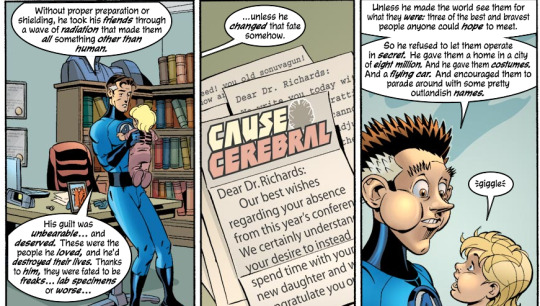
Reed Richards, in turn, is defined (INCORRECTLY, I say, feeling a plasma crackle barely miss my skull) as the smartest man on the planet, a mental superhuman who operates on a level above and beyond that of everyone around him, and a freak accident during a space travel grants him physical superhumanity to match, with his body able to morph and bend under his will. He alleviates the ruler/savior/destroyer conundrum Coogan described in much of the exact same way described above, kept busy with an endless procession of strange dimensions and aliens and supervillain challenges, and Mark Waid's famous confession scene in Fantastic Four #489 addresses the fate that looms over the Sci-Fi Superman directly, with the "very arrogant man who did something very stupid" pointificating to his toddler child just how necessary it was to ensure that the world would not fear and destroy the people he'd irreversibly mutated as a result of hubris, what is even the point of his grandstanding title and colorful outfit and public adventures and all that.
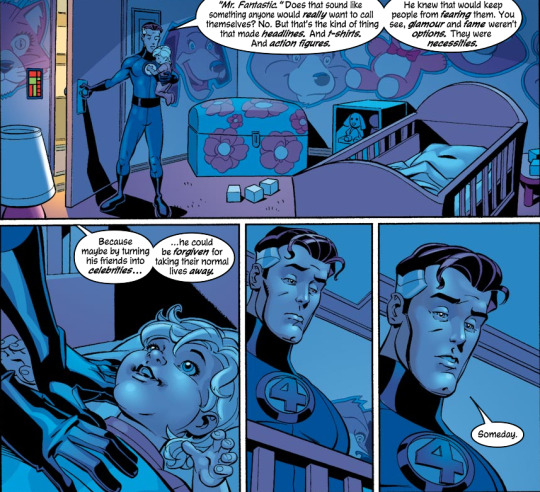
The life of superpowered adventurer celebrities was a necessity, and his superhero persona, Mr Fantastic, is a tabloid-catching act of penitence to mask his ultimate shame and to compensate the people he loves most. He lives for science, he craves discovery above all, but as far back as the Lee/Kirby stories, he still drags the team into awful intrusive press conferences none of them want to go but must, he sits through meetings with hardass generals to buy his team more leeway and trust, he takes the time to stretch across the city to visit sick children in hospitals and say hello to passing helicopters, he has to be the stick-in-the-mud dad who stretches himself thin to keep Johnny and Ben from ditching the team or seriously hurting each other (those first Johnny and Ben spats get way more violent than you'd expect), and he has to make difficult and even manipulative and harsh decisions even then to save the most lives he can. He carries a responsability to his family and loved ones first and foremost, and fashioning himself and them into superheroes is how he lives up to that responsability. It's what allows them to exist and thrive in-universe as much as out of it.
(We're not gonna play catch-up to the "why doesn't Reed Richards cure cancer" conversation but even that, in itself, is an extension of a thread that we can trace back to Doc and the Sci-Fi Supermen before him, when seams in the fantasy start showing with the introduction of consequence, a trend that particularly catches up to these scientist superhero characters who followed in Doc Savage's wake, and obviously caught up to Doc himself several times by now, for reasons @artbyblastweave describes as "a consequence of contemporary writers being Allowed To Notice And Unpack Things" and elaborates on very neatly here)
As a superhero, Reed Richards exists in conversation with Superman and Batman, same as every other character within the superhero "genre", which means he also exists in conversation with those traits borrowed from Doc Savage, and The Shadow, and all these other guys listed who were crucial in their development and a lot of others I'm leaving out of the conversation for now. A crucial part of that conversation and where the Fantastic Four figure into it is the fact that they were designed to not be traditional superheroes but to flip most if not all the conventions established on it's head, a part of that being their initial lack of uniforms (and when they did get uniforms they were just that, uniforms, rather than costumes), the lack of a secret identity, and the fact that the Four are scientists and explorers first, and crimefighting superheroes a distant second they're forced to frequently make a close second or first priority. Marvel made it's big defining pop culture splash with the Fantastic Four by turning superhero convention on it's head and doing as much as they could to do the opposite of what Brand Echh was doing.
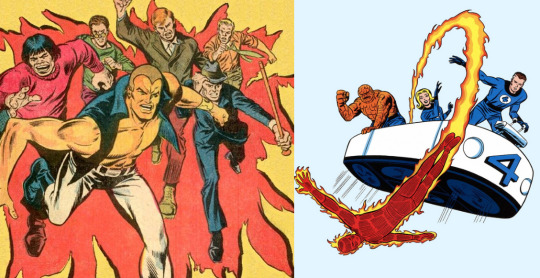
And that's kinda the main reason they end up inviting similarities with Doc Savage and other pulp heroes, because they're going out of their way to imitate and subvert traits and tropes that Superman and Batman were already imitating and subverting from those guys in the first place, that they in turn were imitating and subverting from guys that came before them, and etc.
Archetypes are breakthroughs, and no breakthrough happens in a vacuum. In the end, a lot of these strands and connections between these characters are less specifically the result of writers consciously following in the footsteps of Doc Savage and those that came before or alongside him, and more so with the fact that there's only so many left turns you can take before you just end up in a circle, or reinventing the wheel as it were.
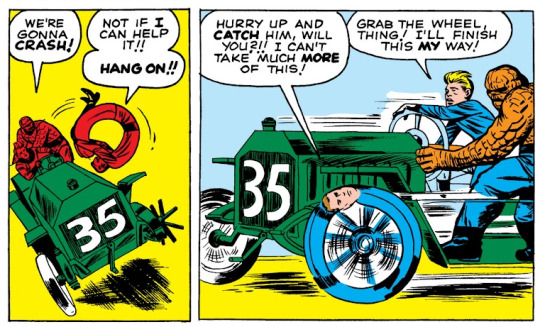
#replies tag#pulp heroes#pulp fiction#superheroes#marvel#marvel comics#doc savage#lester dent#reed richards#fantastic four#stan lee#jack kirby#mark waid#comics
69 notes
·
View notes
Text

Letters page from Marvel's Doc Savage No. 1, October 1972. As it was the first issue they used it to give a profile of Doc and his 'Fabulous Five'. Art by Ross Andru and Jim Mooney.
12 notes
·
View notes
Text

thepulp.net
‘The Man Behind Doc Savage’
; Abre uma nova aba
In 1974, Robert Weinberg edited and published a short booklet (130 pages) titled The Man Behind Doc Savage: A Tribute to Lester Dent. For a while I just thought it was a bio of Lester Dent, but I r…
...
2 notes
·
View notes
Text

I painted this watercolor of Pulp Hero Doc Savage last year, he is the inspiration for modern Several Super Heroes; Since debut in 1934 Doc Savage captivated audiences with his adventures in Pulp Magazines, Novels, Comics, Radio and Film, It's safe to say The Man of Bronze has withstood the test of Time.
#Doc Savage#Man of Bronze#Pulp Magazines#Pulps#Clark Savage#Watercolors#Clark Savage Jr#Pulp Fiction#Pulp Heroes#Street & Smith#Two-Fisted Pulps#Kenneth Robeson#Lester Dent#Traditional Art#Watercolor Illustration#Watercolor Art#Proto Super Heroes
5 notes
·
View notes
Text
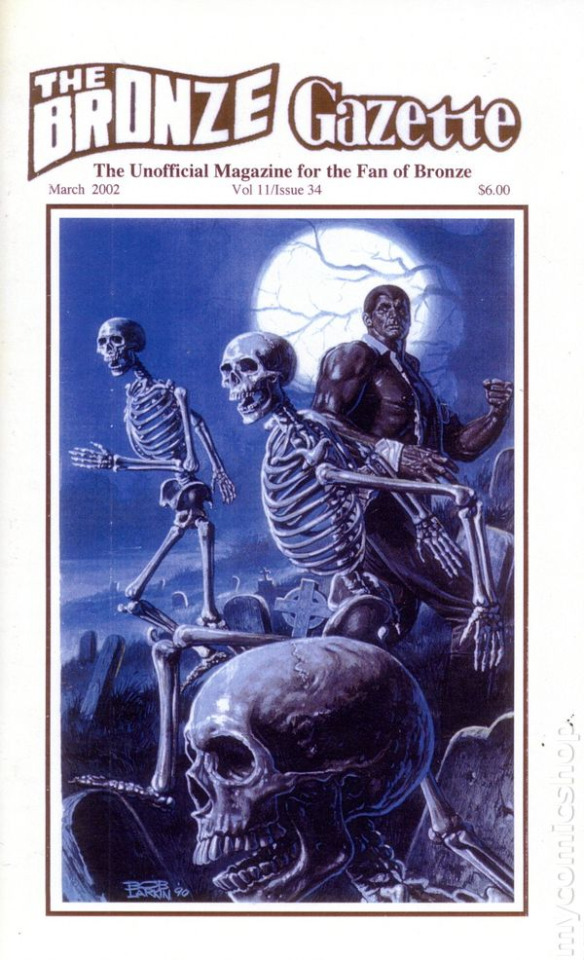
THE BRONZE GAZETTE Fanzine Vol. 11 No. 34 (Green Eagle Publications, 2002)
"The Fan of Bronze"
Art: Bob Larkin
The BRONZE GAZETTE is still going, I'm glad to report!
#doc savage#clark savage#man of bronze#pulp#horror#pulp horror#pulps#bob larkin#pulp books#pulp magazine#fanzines#golden age pulp#smith and street#kenneth robeson#lester dent#science fiction#pulp scifi#pulp illustration#pulp magazines#golden age
51 notes
·
View notes
Text
Doc Savage
For two generations of young readers — the original pulp fans of the 1930s and 40s followed by the reprint fans of the 1960s and 70s — Doc Savage remains not only an iconic figure but a template for all adventure heroes who came after.
Doc and his team — the ape-like chemist Monk Mayfair, his rival attorney Ham Brooks, construction engineer Renny Renwick, electrical engineer Long Tom Roberts, archeologist / geologist Johnny Littlejohn — inspired such diverse teams as Captain Future and his crew, the Challengers of the Unknown, the Fantastic Four, the crew of the Enterprise, Buckeroo Banzai’s Hong Kong Cavaliers (many of whom, we must be fair to observe, executed the formula fair more successfully than Doc and his crew), and Team Venture.
Doc also proved a direct inspiration (read “rip off”) of several key concepts later popularized by Superman, including “the man of bronze” vs “the man of steel” and first use of an arctic Fortress of Solitude for those times when he just needed a break from adventuring.
There have been radio serials, comic books, movies (one by producer George Pal, another by teen fans in the 1970s), and a heart-breaking number of announced but never made media projects, including a serial (eventually rewritten as Fighting Devil Dogs) and abortive TV projects (including a proposed animated series by Ruby-Spears that went so far afield of the original concept that it’s a blessing it got shelved after early development).
So what makes the character so fascinating?
He represents an ideal embodiment of the ultimate of humanity abilities. Unlike Superman (born or another planet) or other superheroes (either mutants or enhanced by some form of magic or super-science), Doc’s abilities are the result of his father’s relentless training regimen for him since birth. He’s a brilliant polymath in all sciences (a legit doctor with and MD plus a plethora of PhDs), a fluent linguist in virtually all languages including ancient Mayan and American Sign Language, a skilled mimic and disguise artist, an expert martial artist and judo master (this at a time when martial arts were virtually unknown in America), plus a pilot / sailing master as well as a world renown philanthropist.
The only thing he isn’t is genuinely human, and from the very beginning there’s an unspoken yet nonetheless present undercurrent in all his adventures that his frantic activity is pretty much a defense against admitting he really has no inner personal life.
Over the next several months (probably years) I’m going to recap the Doc Savage novels as re-published by Bantam Books in the 1960s. Their covers by James Bama probably did more to cement Doc’s iconic appeal than the stories themselves, creating the look that every succeeding interpretation has followed. While Bantam eventually reprinted all the original pulp stories, they didn’t do so in order of publication; I will add that to help you understand the development of the character and series.
© Buzz Dixon
2 notes
·
View notes
Text

"Lester Dent created a hero who used gadgets to solve mysteries and fight crime. No, it's not Doc Savage, but Lee Nace, the Blond Adder!"
1 note
·
View note
Quote
The writer learns they have palm trees in Egypt. He looks in the book, finds the Egyptian for palm trees, and uses that. This kids editors and readers into thinking he knows something about Egypt.
Lester Dent
1 note
·
View note
Text
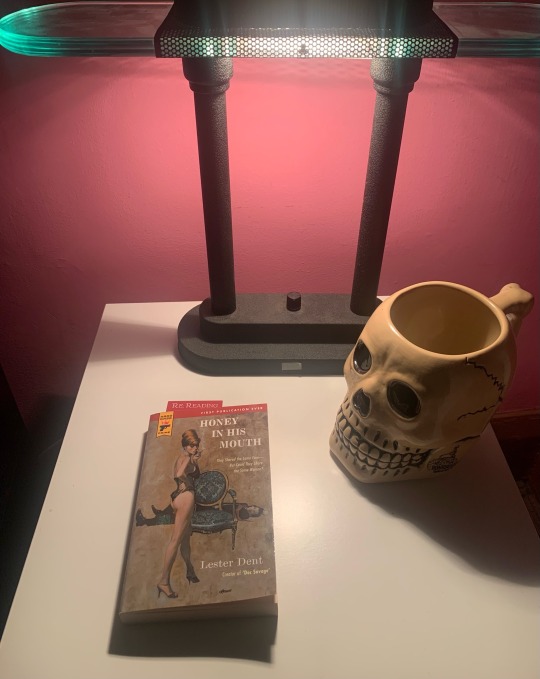
Currently Reading
Honey In His Mouth by Lester Dent
0 notes
Note
whats the deal with Doc Savage?
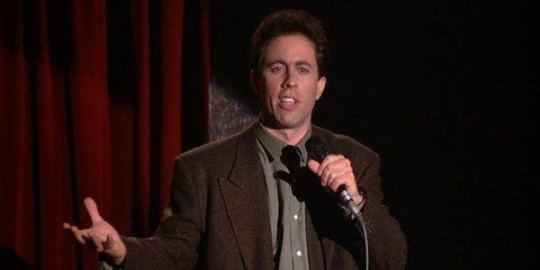
"He's a doctor, okay, but what's so savage about him? That he goes in public without a shirt? Y'know, he's got a caveman in his group and everything, and that guy is a chemist who runs around doing monkey flips and beating bad guys with his bare hands. Why don't they call him Doc Savage? He’s doing more to deserve the name.”
“Everytime it’s something weird and horrifying happening that only he is able to solve. And it's always some guy running a con at the end. Everytime Savage rolls into town, it's like opposite world when it's the doctor who has to save people from being scammed, instead of the other way around.
"I'm just saying, nobody's that perfect. He goes around with guns shooting people with what he calls "mercy bullets" that only put bad guys to sleep. Yeah, they go to sleep allright, and if that fails, I'm sure the compassion grenades do the trick.
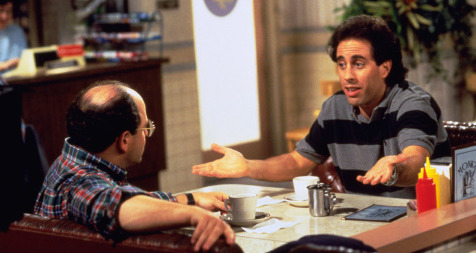
"You're saying they rejected your application for the Fabulous Five? That's nuts."
"Blew me out the front door, I tell you! Total insanity. Newman was there, he saw the whole thing."
"No, what's insane is that you thought you had a shot in the first place. Nobody "joins" the Fabulous Five, it's like the most elite group in the country. What did you think you were adding there?"
"Jerry, how hard can it be to play sidekick to that guy? He does everything they do better, I'd just have to sit around playing cheerleader and wait for him to save the day, I already do the first part all day around you. It's the perfect job! What, you think you're too good for it?"
"No, but I have a little something called self-esteem. It's the Fabulous Five, George, not the Fabulous Plus Extra. They already made room for that girl cousin of his, they're not making extra for you."
"Maybe, shmaybe. Unless I got that Tom guy fired. I mean, he looks like he's on his way out the door as is. "Electrical wizard", pssht, I could do that."
"Sure you could. I mean hey, why don't you ask Elaine to set up you two? She got to meet Doc himself last weekend."
"No way."
"I'm serious! Apparently Doc saved Peterman's life during a mission in Burma and they'd kept in touch since then, and she got some kind of date with him out of it."
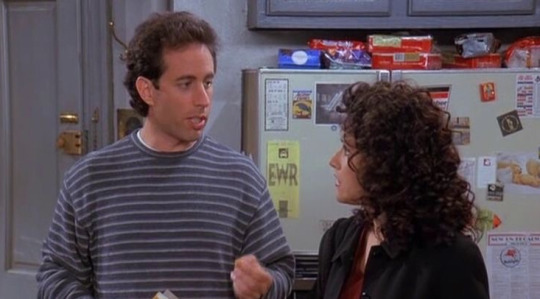
"He was a no show?"
"Oh, he is all show allright."
"So you two -"
"No! I mean, I got to see him in action a couple of times and, yeah, I tried. But every date with him was a wash, he always needs to cut things off halfway to go fight some supervillain, and then he never calls back. He barely even looks at me when we're IN the date."
"Well he's Doc Savage. He's like Superman, y'know, he's got places to be and people to save.
"Yeah, and who's gonna save me? I swear Jerry, it's like he's never even seen a woman before. Him and those five morons around him, bunch of misogynists. Whatever, he's hot, but I'm over him. Miss Savage no more."
"I'll bet. Hey, what's this?"
"Oh it's from the fitness spa I'd been going near work. There's this girl I'd been talking to lately ever since Peterman assigned me the Hidalgo Trading Company catalogue, she's been giving me the skinny on Doc and his frat boy clubhouse
"Oh?"
"Yeah she's big, like, really big, really smart too. She's got a yacht, even. Apparently she does a lot of traveling. Anyway, she's this fitness freak with a great tan and bronze hair and, big muscles, and she's got these beautiful gold eyes and-"
"And you're saying all that because you think I'd be into her?"
"Huh? You? Oh, pfft, no, she's way too much for you."
"I'll bet. And, uh, what's her name again?"
"Oh everyone at the club just calls her Pat. Mystery lady. I'm meeting her down at her yacht next week."
"Yeah. Miss Savage no more, huh."
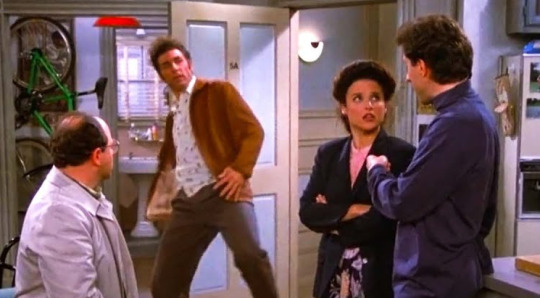
(SLAM)
(audience cheers)
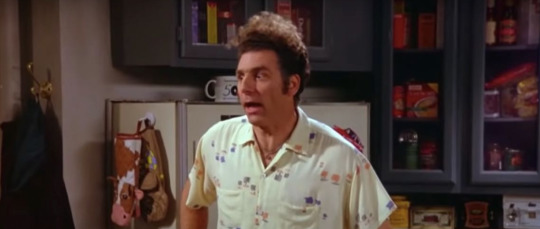
"Hey, how did things go at the Crime College?"
"Oh it-it-it was a NIGHTMARE! It-itya it's like waterboarding at Guantanamo Bay, Jerry! Way less fun than it sounds!! I'd heard the name on the street and signed up to learn how to fight crime, nobody told me what it was actually about!
"What happened?"
"Well, at first it was kinda nice, actually. You sign up at the Hidalgo Trading Company lobby, and they ask you to submit your criminal record. I figured, hey, safest place to leave it, right? You meet some of his assistants and everything, and when they hooked the eletrodes to my brain I thought hey, *click* free brain massage along with crimefighting lessons for free!"
"Wait Kramer back up, electrodes?"
----
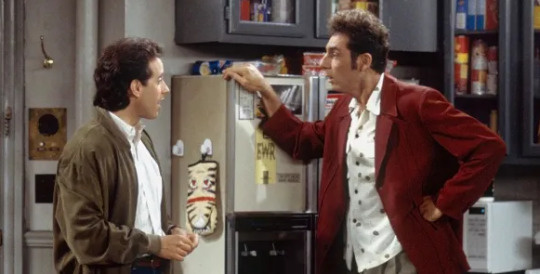
"Allright so if I get this straight: You signed up for a program Doc Savage's running that nobody knows about called the Crime College, thinking it was gonna teach how to fight crime. You get in there and it's some kind of nuthouse where Doc Savage tries to pry open your brain with a drill."
"A-yup."
"And he's lobotomozing criminals all over town because he's running a program where he, what, carves their brain to make them stop being evil and gives them new identities outside of town."
"Ye-yup."
"And they never remember who they used to be? They never come back, not ever, they just become model citizens as far away from here as possible? Are you 100% sure it actually works?"
"So they said, yeah."
"...Hey pass me the phone for a minute, will ya-"
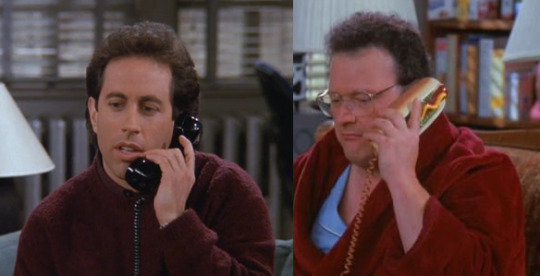
"Hey Newman, I heard from Elaine that the Hidalgo Trading Company is hiring now."
49 notes
·
View notes
Text
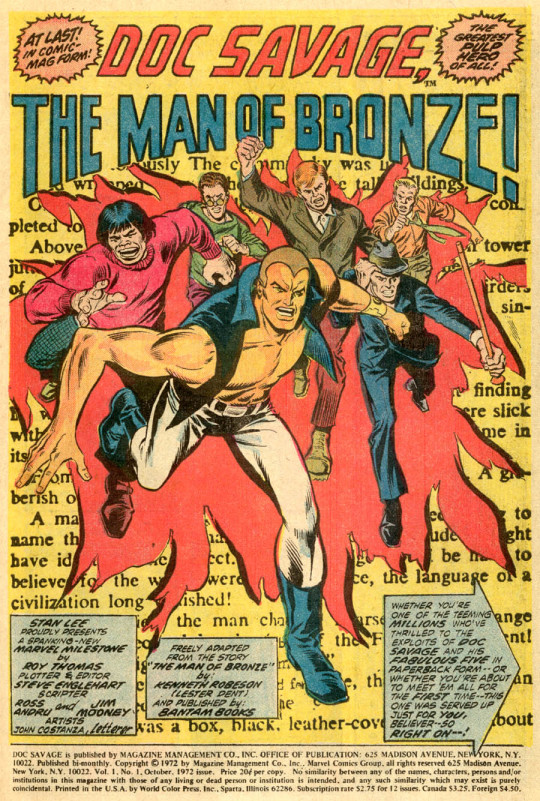
Splash page from Marvel's Doc Savage No. 1, October 1972. Art by Ross Andru and Jim Mooney.
13 notes
·
View notes
Text

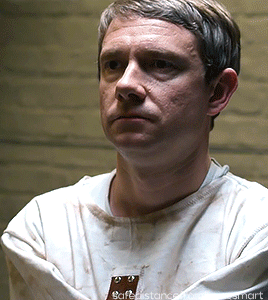
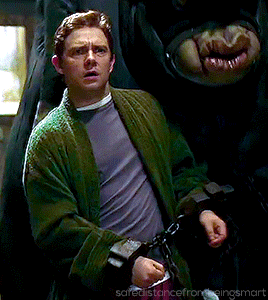
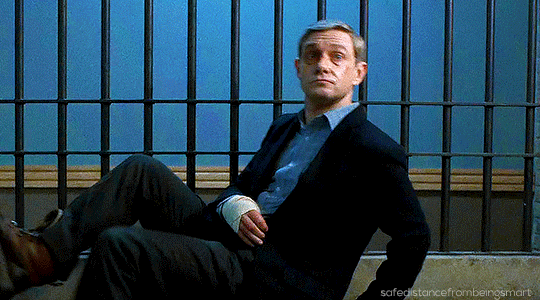
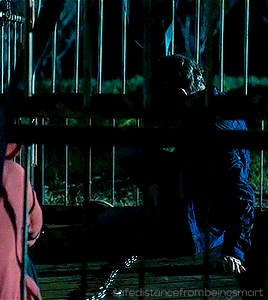
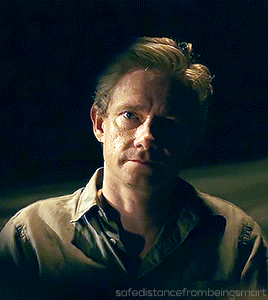
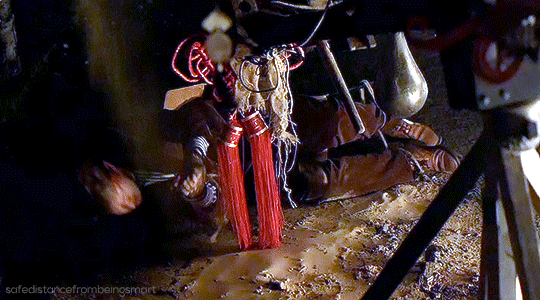
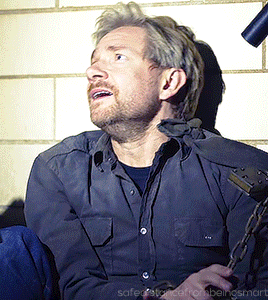
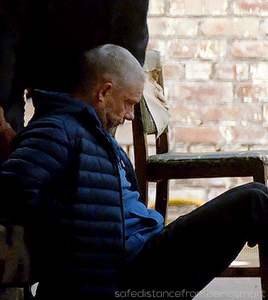
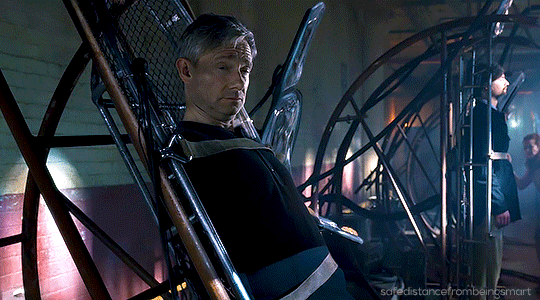
Martin Freeman's characters locked up, tied up or chained
👀👀
As it happens sometimes when I talk to one of My Favourite Watsons™ (@colourfulwatson this time), the best ideas are born. Or implanted in my mind. One evening @colourfulwatson casually asked "Hey, have you ever made a gifset with Martin's characters tied up or chained?" And I had to a say "Sadly, no." 😬 But I was instantly hooked on the idea. Because how could I not?
What a fun set to make. Thanks for the great idea and pointing me to the perfect scenes (I never would have thought about The Voorman Problem) @colourfulwatson 😘 Half the credit for this goes to her.
The Hobbit- An Unexpected Journey
The Voorman Problem
The Hitchhiker's Guide to the Galaxy
Fargo
Cargo
StartUp
Sherlock
Whiskey Tango Foxtrot
The Responder
Secret Invasion
#martin freeman#john watson#bilbo baggins#sherlock#my gfx#the hobbit#the responder#arthur dent#the hitchhiker's guide to the galaxy#secret invasion#everett ross#fargo#lester nygaard#phil rask#iain mackelpie#martinfreemanedit
334 notes
·
View notes
Text
Martin characters that I love and why
John: It's literally me.
Arthur: it's a godsend.
Lester: I think he has a pretty interesting development arc.
Everett: Cool, smart and a good person.
Andy: A little stupid but a noble soul.
Iain: Iain.
#everything it's always about iain#martin freeman#john watson#bbc sherlock#iain mackelpie#arthur dent#lester nygaard#andy rose#everett ross
5 notes
·
View notes
Text
i love you british guys named arthur who are just having a WEIRD day
5 notes
·
View notes
Note
So I was reading your Athena & Apollo headcanons and it made me think of a hc to help fill a (very mild but infinitely frustrating) plot hole in the books! (Well, plot hole is stretching it, it’s not even a plot dent, more like a detail inconsistency that affects Literally Nothing but it has driven me crazy since I read mcga)
The detail in question: Why are all of Athena’s kids blonde and (possibly) curly-haired, when Annabeth is said to get her hair from her dad and Athena has never actually appeared as a blonde? (Aside from that time in Sea of Monsters but tbf that was a hallucination so possibly not accurate). It’s bothered me for a while, because Athena doesn’t Do romance and therefore it wouldn’t really make sense for her to have a Type, right? Why would someone attracted to mortal’s intellect care about their hair color? I guess I just figured she’d been blonde for a while and decided to go brunette later, but the “dumb blonde” stereotype has been around for a long time, having been especially prevalent since the ‘50s, and I can’t imagine Athena to want to be seen as anything less than the smartest person in the room.
But then your hcs got me thinking… we know that Athena is very proud, but she’s also deeply insecure. Like, “she got made fun of for playing the flute One Time by two goddesses known to be bitchy that she already did not get along with and threw it into the woods with a curse and refused to pick it up again (until Apollo coaxed her to)” insecure. And she doesn’t have very many friends, does she? Apollo’s kind of all she has, other than mortals, but her relationship with mortals is that of a devotee and a god. Reverence is not the same thing as connection. But Apollo, who is in a similar boat to her, makes connections so easily! Even at his worst, he makes people like him against both his and their will. Even his relationships with his devotees were… well they were messy lbr but they were also very genuine, most of the time. There was something more, there.
So, all this rambling to say: what if the reason Athena’s kids all look so similar is because Athena chose to look like Apollo? I don’t think she chose to act like him, but. I dunno. Maybe she thought mortals would like her better if she looked more like her pretty, popular brother. She’s always had to listen to people, mortals and immortals alike, praise her brother for just about everything while she had to fight for even a scrap of respect. Maybe she thought she could absorb at least a little of that something that makes people genuinely like him. That something that draws her to him again and again. Maybe it’s like armor, pulling on her brother’s face. If they don’t like her, it’s not because it’s her, right? Apollo’s been driving everybody crazy lately, anyway… (and yet, he’s still more beloved than her…)
And that ALSO feeds into my preexisting headcanons about Apollo looking like a Chase, which is fun!! (I think his modern godly form looks more similar to Magnus but Lester has a face/hair texture that is really, really similar to annabeth’s! So when he bashes the two forms together he makes the two of them look even more like siblings because he’s basically a bridge between the two of them, lol. But his old godly form looked strikingly similar to Annabeth in a lot of ways… hmmmm.)
Anyway it’s kind of a convoluted hc and once again falls into the “Apollo is the specialist little guy in the WORLD” mindset but I!!! Just like it!!!! When siblings are weird and messy!!! And admiration gets mixed up with jealousy and genuine affection is twisted by circumstance and time!!! And identity issues!!! And loneliness!!! It’s latching on to someone and having them be your whole world when you know that you’re just a small part of theirs!!! AUGHHH. Weird fucked up Olympus dynamics my belovedddd
HELLO LONG ASK
I never noticed this before, but this explanation seems Interesting👀
And don't worry, this fandom basically goes "AND THIS IS WHY APOLLO IS [insert description here" ALL the time XD
BUT YES THE COMPLICATED RELATIONSHIP EAT THEM UP WE ARE EATING THEM TOGETHER!!! :D
#the oracle speaks#the trials of apollo#apollo#athena#knowledge n wisdom#pjo apollo#pjo athena#magnus chase and the gods of asgard#magnus chase#annabeth chase#fredrick chase#natalie chase
59 notes
·
View notes
